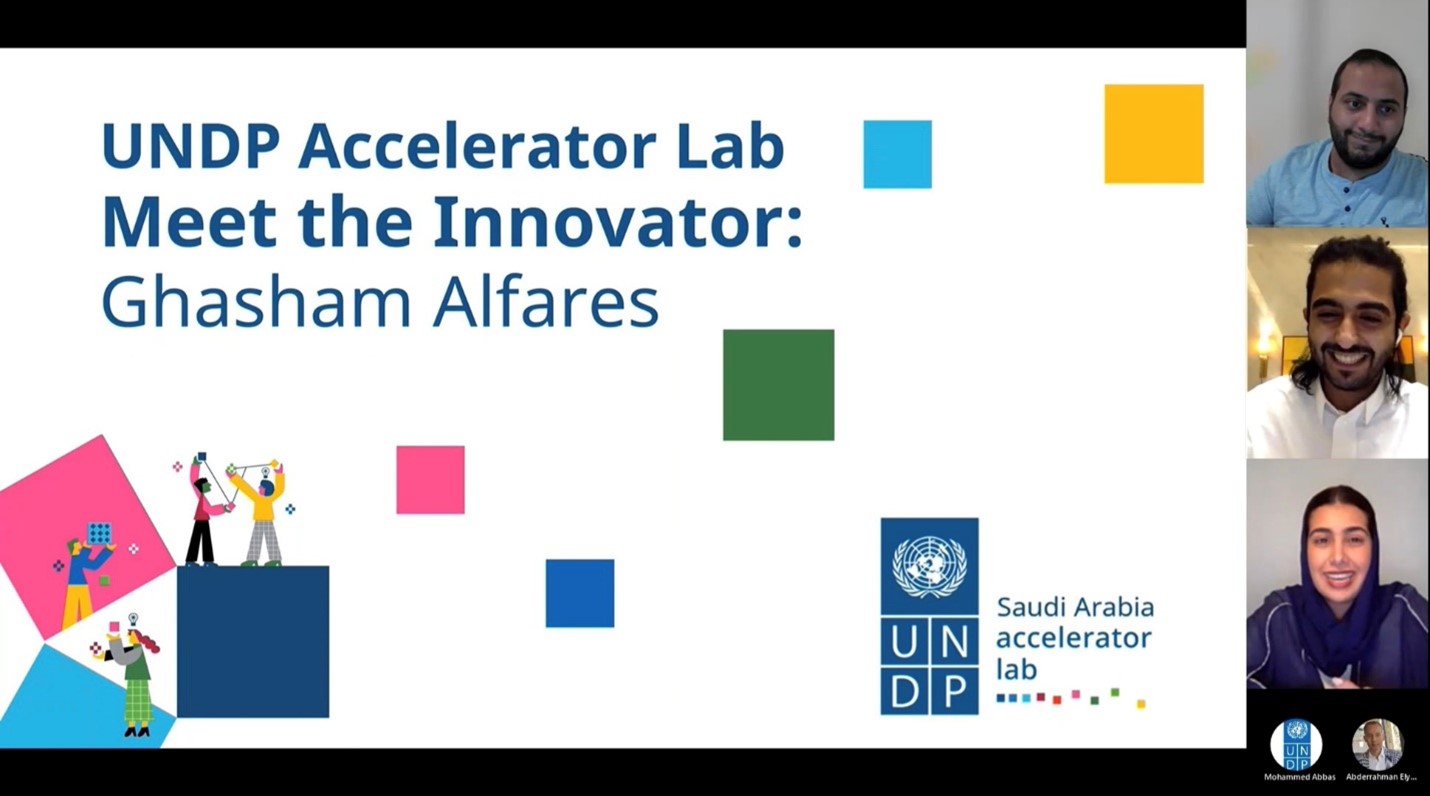Layan Faisal Al Saud, Head of Solutions Mapping, UNDP Accelerator Lab
Innovative solutions stemming from local needs… Experiences shared by Saudi Innovators
December 20, 2022

Ghasham is a Saudi inventor and science researcher from AlMajma’ah Governate. In 2017, he moved to the capital Riyadh to study to become an Aircraft Technical Engineer. He noticed the number of coffee grounds being wasted in cafés. This drove him to do something, as his hometown of Rawdhat Sudair is considered a farming community. From this stemmed Ghasham’s solution “Start Recycling” to recycle coffee grounds into fertilizers. He had started with one café in his hometown where he placed a shelf that customers who would come to purchase coffee could also leave with a free fertilizer for their farm. His initiative grew covering 80% of his hometown cafés in the Sudair Region. He is currently aiming to expand his initiative both geographically and through the variation of products.

Asrar Damdam is a PhD Candidate from Jeddah in the electrical engineering program at King Abdullah University of Science and Technology. Her PhD research is focused on Food Waste Prevention and the Internet of Food (a new concept focusing on increasing the efficiency and reducing the food loss and waste in various points in the food supply chain). She noticed how households produces the majority of food waste at 61% across the food supply chain. Saudi Arabia is one of the top countries that generates food waste. From this stemmed Asrar’s initiative to reduce this number through effective solutions to tackle the global challenge of cutting down food waste by founding Uvera, which uses physical and computational technologies to reach food loss and waste prevention.

The Nano club is a student-led initiative under the King Abdullah Institute for Nanotechnology at King Saud University in Riyadh. Faisal Alsubaie was one of the founders of the club who has graduated while Malik Alhalees and Saleh Aldeligan are first-year medical students. With the announcement of the Saudi and Middle East Green Initiative, they started thinking about the environmental state in the Kingdom in terms of its hot arid weather as well as soil conditions and irrigation efficiency. They searched for solutions that would suit the context by preserving water in the soil. They were able to recycle agriculture and organic waste promoting a better environmental ecosystem. Through such initiative they are utilizing the local waste and creating valuable products.
What do these Saudis have in common? Innovative solutions stemming from local needs and challenges. In Saudi Arabia many citizens are passionate about enhancing their direct community at a local level and the world at a global level. As an Accelerator Lab in Saudi Arabia, we wanted to hear more from the local innovators to have a better understanding of what was the drive behind their innovations? What need does it meet? What are the challenges they may face and what may be needed to ease these challenges? What are the lessons learned?
Based on the conversations several insights have been shared…
A lot of the innovators started from a sense of social responsibility rather than business motive. What helped in the success of these initiatives is the engagement with the community and understanding on the ground what are their needs and how do they interact with the solution. The innovations capitalized on evident challenges they’ve witnessed and try to find ways to positively impact their society in the hopes of protecting the environment for us and the future generations.
As much as it is important to take initiative and persevere rather than wait for the right circumstances or for others to make things happen, the innovators have highlighted some recommendations of what an ideal innovation ecosystem in Saudi Arabia would look like:
Creating a stronger innovative infrastructure in the kingdom is tapping into the Saudi mindset. How can we shift the mindset from the fear of failure and negative perceptions it pertains to the idea that one learns “from mistakes more than successes”? Another innovator mentioned “the Saudi culture is still not fully open to the idea of experimentation”. It was mentioned that it should start by embedding these ways of thinking in schools, universities and homes through initiatives such as campaigns. Another perspective that has been raised is young innovators may not be taken as seriously and perceived as not having enough experience to be fully supported.
Smaller initiatives should be perceived as valuable and it is important to find potential in encouraging them to grow and succeed by investing in them. Building start-ups is difficult and takes time. The current state of incubators in the Kingdom offers little flexibility and needs to be more agile.
In terms of logistical matters, there is a need to provide the right environment and facilities to test, experiment and scale. Champions of innovation from diverse sectors play a role in nurturing the innovation ecosystem from governmental, private, non-governmental and academia. Joining efforts within the same sector to prosper is important for example a suggestion of “building relationships with other impact ventures to apply for grants and accelerators due to the difficulty in funding such ventures”.
To summarize what some of these positive Saudi changemakers have mentioned: We all have an impact and footprint in this world. How can we work together to create a positive impact? Engagement is key. In order for solutions to grow, we need to believe in them and readily invest.
If you are an innovator and would like to share your story and experience, please do reach out to us on acclab.sa@undp.org .

 Locations
Locations


